Updated for 2026:
How Much Is Your House Worth?
The definitive guide for UK home sellers
Insider Secrets
Keep reading to discover…
- The truth about Zoopla’s online house valuation calculators
- Common myths about property valuation
- How to make estate agents give you honest valuation advice
- And lots more…
Table of Contents
-
Get FREE valuations from top rated local estate agents
-
Why you need an accurate valuation
-
Part 1: How accurate are Zoopla valuation estimates & house price calculators?
-
Forget Zoopla! Get FREE valuations from top rated local estate agents
-
Part 2: How much is your house worth today?
-
Find the best estate agents to sell your property
-
Part 3: Common myths about value
-
Part 4: How to intelligently research open market value
-
Part 5: The problem with free valuations from most estate agents
-
Find out which local agents give the most truthful FREE valuations
-
Final thoughts
-
Get FREE valuations from your top rated local agents
-
Related guides
✅ Are Zoopla valuations accurate?
No! Zoopla valuations can range from wildly inaccurate to uncannily on the money (and everything in-between). Never rely on what Zoopla says a property is worth.
✅ Are estate agent valuations accurate?
No! Estate agent valuations are often coloured by their desire to secure you as a client. And who doesn't love being told their home is worth more than they thought!?
✅ Are asking prices a good measure of what my house is worth?
No! Asking prices are not 'getting prices'. You can ask whatever you like for your home but it doesn't mean a buyer will pay that amount.
Get FREE valuations from top rated local estate agents
We’ve teamed up with estate agent comparison service GetAgent to help you discover which local agents will give you the most accurate FREE valuations:
Why you need an accurate valuation
Here’s why you want to form an accurate assessment of what you home is worth, and not ask too much money:
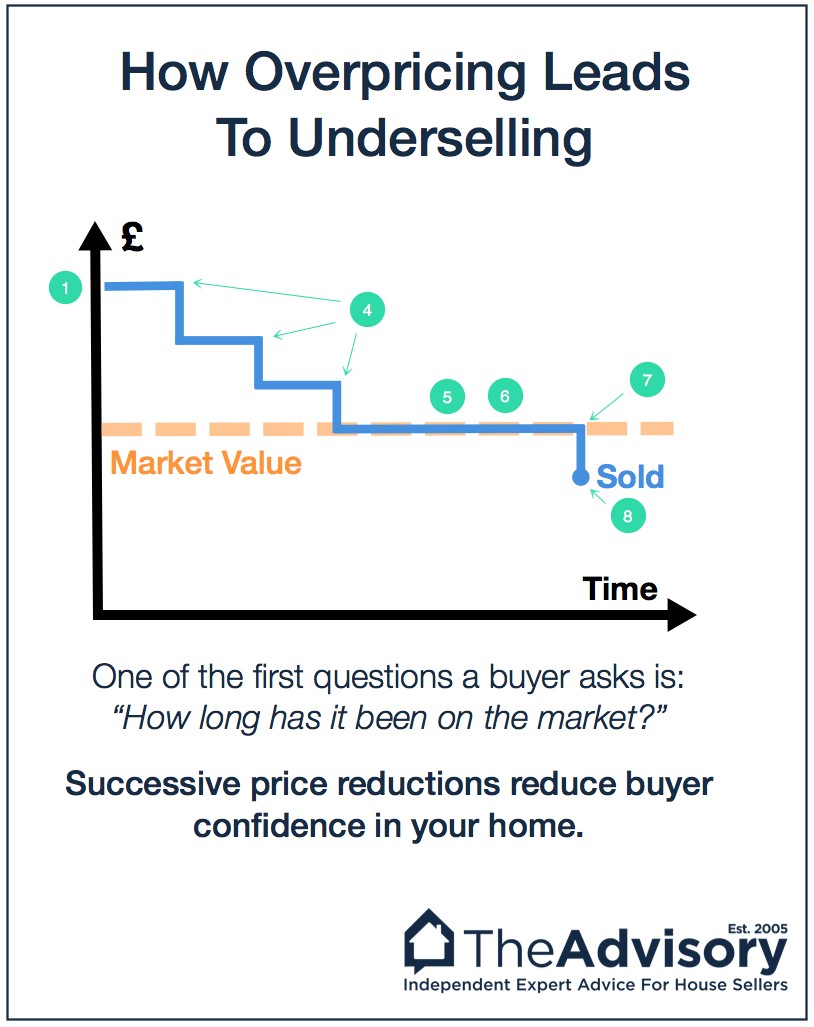
Step by step:
- You set a high initial asking price (above ‘Market Value’) in the hope it attracts a high offer.
- No one makes you an offer so you sit and wait.
- While you sit and wait, your overpriced home helps make more competitively priced property look better value for money – you actually help others to sell before you!
- Eventually you bite the bullet and make a small price reduction. You wait but it does nothing so you reduce the price again. This goes on until you reach the point where your property is priced at ‘Market Value’ – It should now sell but it doesn’t.
- The problem now is because so much time has passed, and the property been so overexposed to the market, it’s become a ‘stale listing’.
- Buyers start to think “What’s wrong with this property?” – They have lost confidence your home is a ‘good buy’ and continue to stay away reluctant to offer.
- To generate offers from serious buyers you have to reduce your price below ‘Market Value’ to counteract the negative stigma now attached to your property.
- As counterintuitive as it seems, properties initially priced above ‘Market Value’ tend to sell for less that they could have if their original prices had looked more attractive to buyers.
End result = You undersell (& lose £1,000’s)
Many house sellers have to live in denial about this, and are forced to tell themselves there’s no way such a struggle could’ve resulted in anything other than the best possible price being achieved.
That’s a horrible thing and a fate we fully intend to make sure you avoid.
Part 1: How accurate are Zoopla valuation estimates & house price calculators?
Who doesn’t love a free online house valuation tool (or ‘AVM’ as they’re known in the trade)?
They give the impression it’s possible for anyone to determine the ‘value’ of a property without having to talk to an estate agent.
Top of the heap is household name, Zoopla.
Understandably, figures from the Zoopla algorithm often hold a lot of credibility in the publics’ eyes…
…Especially when the figure is higher than expected – Sellers understandably love this – Buyers not so much.
But is Zoopla accurate?
Everyone ‘in’ property will tell you the answer to this is a firm ‘no’ (especially in cold markets).
Here’s an example from 14th November 2017:
Zoopla thinks the property is worth £1,049,000 yet it’s been failing to sell at £740,000 since January 2016 (that’s nearly 22 months).
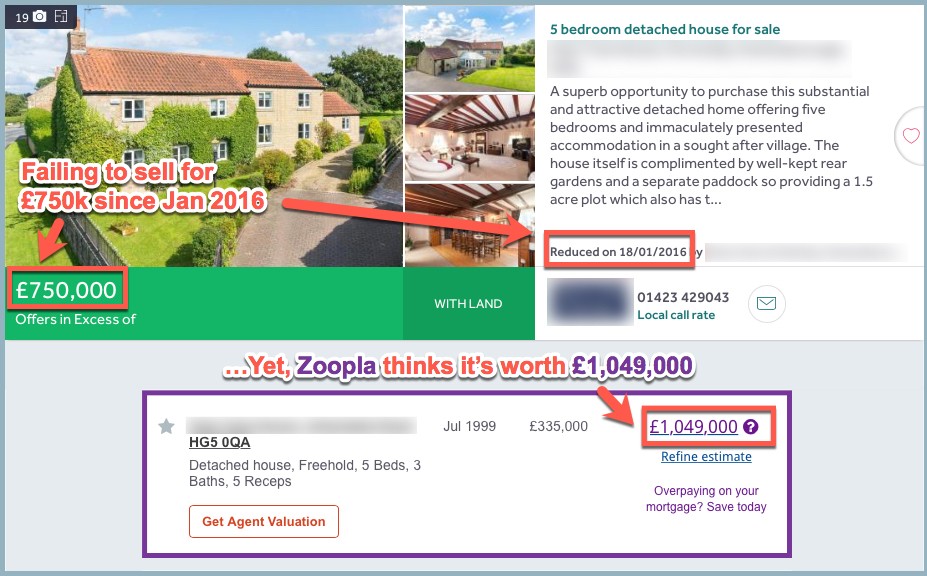
Putting property valuation calculators to the test
Here’s a real world example of a property we owned (and recently sold) in Bristol.
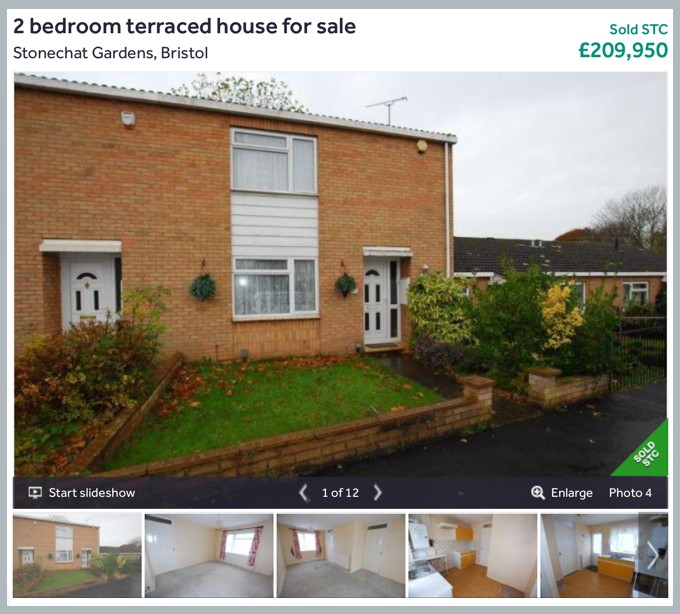
My team and I formed the opinion that buyers would probably pay £205,000 for it.
We came to that conclusion after:
- Looking at what other similar properties had recently sold for.
- Looking at what other similar properties were currently failing to sell for.
- Interviewing local estate agents.
- Checking all the facts and evidence in the market.
Our strategy was to set the asking price at £209,950 with a view to accepting offers as close to £205,000 as possible.
- In this price bracket, the market was ‘hot’ (i.e. a sellers’ market).
- We knew, if priced correctly, the house would sell fast.
What happened next?
- Property went live in the market with an asking price of £209,950
- We had an immediate flurry of viewings and received a couple of offers around £195,000.
- After 4 rounds of negotiation, one of the opening offers was negotiated up to a best and final offer of £206,000 (£195k -> £200k -> £203k -> £205k -> £206k).
- We accepted £206,000 (£1,000 more than we’d hoped to achieve), took the property off the market and instructed solicitors to get cracking.
So, ‘a right result’ as they say.
And also, validation of our ability to form an accurate opinion of what buyers would be willing to pay in today’s market.
What did the online valuation tools think?
On the day we accepted the final offer of £206,000, we checked the 6 major house valuation tools to see what they had to say.
Tools checked:
- Zoopla
- Propertypriceadvice
- ValPal (found on over 20% of all estate agency websites)
- SmartVal (a competitor to ValPal found on a number of mortgage broker websites and consumer group websites)
- Mouseprice
- Nethouseprices
We won’t put names to figures, as we’re not here to rattle cages, but you can see for yourself…
…What it transpired a buyer was willing and able to pay (i.e. £206,000), and what the online valuation tools said the property was worth, were far from in-sync.
£206,000 = Maximum price achieved from a willing & able buyer (a.k.a. What a house is worth)
| Valuation tool: | Minimum value: | Valuation estimate: | Maximum value: |
|---|---|---|---|
| #1 | £197,000 | £212,000 | £226,000 |
| #2 | £197,000 | £228,000 | £259,000 |
| #3 | £207,000 | £228,000 | £249,000 |
| #4 | £213,695 | £241,000 | £261,000 |
| #5 | £216,000 | £241,000 | £266,000 |
| #6 | na | £362,000 | na |
Conclusions
If we’d based our expectations (and pricing strategy) upon information from any of the above tools, we most likely would have asked too much money for the property.
It’s likely we’d have sat on the market longer than necessary and had to reduce our price.
Either way we’d have been on the back foot which means:
- We probably wouldn’t be able to negotiate as aggressively with interested buyers.
- We probably wouldn’t have achieved £206,000.
- We probably would have undersold (just like the 100,000’s of other house sellers out there that put too much stock in the figures these online tools generate).
Pro tip: Never make any important decisions bases on figures provided by an online valuation tool or house price calculator.
Bottom line
No automated valuation tool can tell you what buyers will be willing to pay for your home.
And, as you’re about to discover, what buyer’s are willing to pay is the only thing that matters (when it comes time to sell).
Forget Zoopla! Get FREE valuations from top rated local estate agents
We’ve teamed up with estate agent comparison service GetAgent to help you discover which local agents will give you the most accurate FREE valuations.
Part 2: How much is your house worth today?
Contrary to popular belief…
…When selling your home, its value is determined by one thing and one thing only -> What a qualified (and able) buyer is willing to pay for it.
No more and no less.
The bottom line, and inescapable truth is this:
Your home is never worth more than what a buyer is willing (and financially able) to pay
So how do buyers decide what they’re willing to pay?
What buyers will be willing to pay for your home; in today’s market (i.e. what they think it’s worth) will be determined by comparing your home to the others for sale right now.
In other words:
Today’s competition determines today’s value of your home
Makes sense when you think about it, after all…
…No buyer can purchase a property that has already been sold – They can only purchase a home that is currently for sale.
You’ve actually already experienced this first-hand
When you bought your current home, how did you establish it’s value?
Think back:
- You probably had budget?
- You probably had an idea of the kind of property you needed?
- You probably had an idea of where you wanted to live?
- You probably got out there and viewed all the properties that looked interesting within your affordability range?
- You probably consciously (or unconsciously) compared all these properties against one another and ended up buying the one that met your needs and gave you the most value for the price paid?
Does all that sound familiar?
We hope so because we’re happy to report nothing has changed. House buyers still behave in exactly the same way today.
Key takeaway:
Essentially, buying a house is a massive comparison-shopping exercise
As such, the value of your home is not determined by:
- What you want for it.
- What an estate agent may think it’s worth.
- What it costs to rebuild.
Instead, it’s value is determined by:
- Buyers comparing it to the other homes available in the market at this particularly moment in time.
In practical terms:
- Buyers visualise the value of one property versus the other(s) available to buy, by comparing the features each offer for the price they are asking.
- Buyers typically do not ask, or care, what the seller’s opinion is of their property’s price / value.
- Buyers determine the intrinsic values to themselves by inspecting the properties and making their own judgments.
- In that regard, the value of your property (when it comes time to sell) simply reflects what buyers think its worth despite a professional’s view
Bottom line:
Today’s competition determines today’s value of your home.
Side note: We often hear people blaming estate agents for driving up house prices to levels beyond their reach.
We hope what we’ve written about the true nature of valuation goes some why to explain why this is such and unfair and inaccurate attack on agents.
It’s the availability (and affordability) of mortgage finance, coupled with buyer demand levels that are the true ringleaders.
A real world example of value being determined by the competition
We recently stumbled across a forum thread (on a financial advice website) that succinctly illustrates how buyers use comparison to determine value.
- The buyer has had an offer accepted on a house but her seller needs to find somewhere to buy before they can exchange contracts.
- The buyer wanted to know if there is anyway to speed things up.
- Other forum posters are asking her why she doesn’t just buy somewhere else.
She writes:
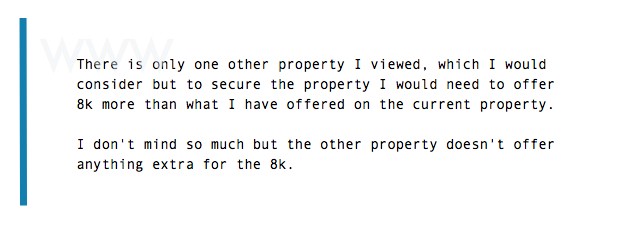
Some useful insights there for house sellers:
- She has compared the two houses.
- She has found the more expensive one offers no extra value (to her) for the extra £8k being asked.
- Therefore, the house is NOT worth £8k more (to her).
And that’s the reality of how value is determined, how properties get sold and why value is not set in stone.
Market value is not static
- Once you understand that your competition determines the value of your home, you start to realise market value is not static.
- It’s in constant flux.
- It changes every time a competing property comes on the market for sale or is sold, and is taken off the market.
Pro Tip: The wise seller remains a student of the market all the way through their sale, and is prepared to adjust their pricing strategy (and expectations about value) to stay competitively priced against the competition.
Market value is not a single figure
Unlike supermarkets where prices are fixed, when it comes to homes, prices are haggled / negotiated…
…Think; car boot sale, antiques fair or Moroccan souk.
Now, It’s true to say a house is never worth more than what a buyer is willing to pay. But what somebody is willing to pay isn’t fixed. It’s variable and can be influenced by a good sales agent through:
- Effective negotiation and sales techniques.
- Generating an atmosphere of excitement and fear of missing out around a property.
Pro tip: The name of the game when selling a house is to get as many serious buyers through your door as quickly as possible, and create an atmosphere of competition.
Competition encourages buyers to pay more!
As such, just because all the estate agents you interview agree the theoretical market value of your home to be £200,000…
…It does not follow that all these estate agents will achieve £200,000.
Estate agents are NOT all the same
True, estate agents all do basically the same ‘stuff’ i.e. marketing, negotiating, building relationships with buyers.
It’s just that some estate agents do this ‘stuff’ substantially better than others.
Experience tells us there is roughly a 10% spread (either side of the theoretical market value of your home) where your sale price can end up.
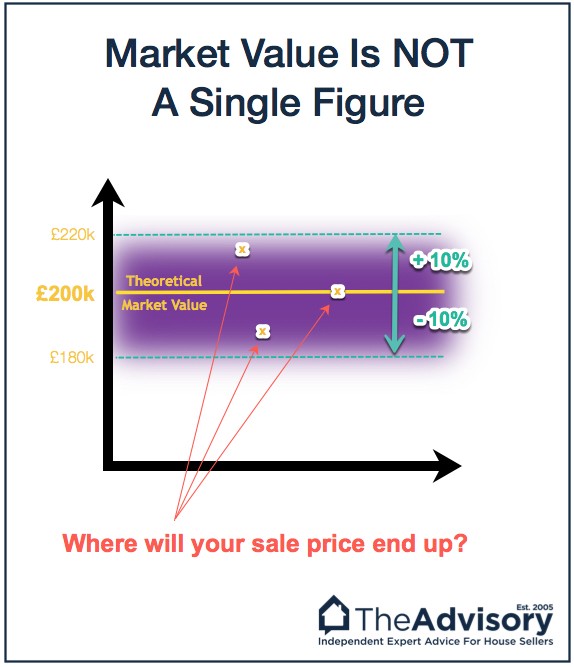
How far above (or below) the theoretical market value of your home your sale price ends up, will be directly determined by:
- Your choice of estate agent.
- The skill of that estate agent.
- The suitability of that estate agent to sell a property like yours.
Bottom line:
A house is never worth more than what a buyer is willing to pay…
…But, what a buyer is willing to pay isn’t fixed.
The right estate agent will get them to pay you more!
Find the best estate agents to sell your property
Compare the performance of your local estate agents using our free and impartial estate agent comparison tool.
Review the success rates, average days to sell, % achieving asking price and typical fees of estate agents in your area:
Part 3: Common myths about value
In part 4 we’ll look at how to do the research and think like a buyer, but first let’s quickly cover a few key points that can get in the way of being able to do that.
Factors that DO NOT affect the value of you home
As discussed (and I hope you agree), value is determined solely by what a buyer is willing (and financially able) to pay in today’s market.
Therefore, none of the following have any effect on the market value of your home (i.e. how much serious buyers will be willing to pay):
- What you paid
- What you need
- What you want
- What your neighbours say
- What your friends say
- What estate agents say
- The cost to rebuild
- The cost of improvements
Consider this…
…If you were looking to buy a house, would you care what the house seller paid for it or how much they spent repairing the roof, or on their kitchen refurbishment etc?
Bottom line(s):
- Primarily, all buyers really care about is what house sellers are asking for similar properties currently for sale.
- If purchasing with a mortgage they’re also going to care (deeply) about what their lender’s surveyor thinks your property is worth.
- To a lesser extent, buyers that are really in the know are also interested in what similar properties have recently sold for (but this is trumped by point 1 & 2).
- A proportion of buyers will check your Zoopla valuation and if it’s low will either be put off your property because of it or use it against you to justify a low offer.
The relationship between cost & value
Lets clarify this by defining some common terms you’ll hear thrown around:
COST
- Cost is the amount you paid for the house plus any capital improvements you’ve made while owning the home.
PRICE
- Price is what you ask (your asking price).
- Asking prices are not necessarily the price you’re going to get.
- When set correctly an asking price acts as bait that attracts buyers to your home.
VALUE
- Value is what your home is worth to one person, someone that needs that exact property.
- The problem is, that person knows they only have to pay market value.
MARKET VALUE
- Market value is the amount that appeals to many buyers and will generate a sale within a reasonable time.
Bottom line:
There is no relationship between cost and market value.
- A home is worth what it’s worth regardless of what you paid for it or what money you put into it.
- Fundamentally, value is what you get out of a home, not what you put into it.
The value of improvements
Often times, improvements made to a home ‘add value to you’ (by increasing your enjoyment of your home) but may not add value to the buyers in the market.
It’s subjective of course, but to see things clearly, think back…
…At the time you embarked on any home improvement project, where you planning on staying or moving?
Staying we’ll bet?
Now let us ask you this…
…If you’d known then you were moving today, would you still have made those improvements?
If your answer is ‘probably not’, then ask yourself ‘why not’?
Most likely the honest answer will be that you know you’d not get the money back.
If the improvements were removed, what percent of today’s buyers would put them back and pay what you did?
The effect of condition on value
Primarily the condition of your home will affect its saleability. But it can (in certain cases) also affect what buyers are willing to pay.
The good news is that condition is one of the few things you have total control over.
The first step is to change your role from being a ‘homeowner’, to a ‘home seller’. Which means converting your home from living condition, to showing condition.
Cosmetic condition effects saleability
Here’s a way to demonstrate the effect of proper preparation.
Take a look at these two £5 notes:
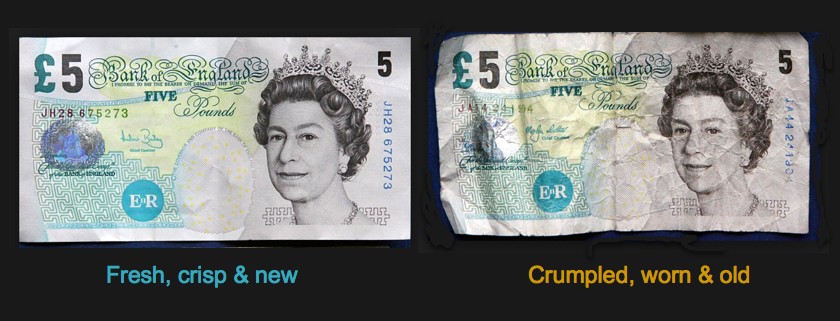
One is new, fresh and crisp, the other is crumpled, dirty and a bit worn around the edges.
If you had a choice between these two notes, which one would you take?
You’d probably take the new one. But, would you pay £6 pounds for it?..
…Probably not we’d bet.
A properly prepared home may not be worth more than market value, but it will be preferred over the competition and probably sell faster.
Major repairs effect what buyers are willing to pay
Repairs protect your investment and keep you from losing money, but don’t necessarily increase the value of your investment.
Buyers look for reasons to eliminate a house from consideration, they inspect property and look for problems in these key areas:
- Roof condition.
- Structural integrity.
- Water damage.
- Plumbing, electrical and water systems.
When buyers find one problem they become wary and look for more.
You need to evaluate and address each of these items in your home, and decide a course of action.
Either correct them properly or provide professional estimates for their repair.
This is the ‘way of the wise seller’ because when buyers estimate time, materials and cost required to fix something, they typically overestimate the actual cost by 2-4 times.
Buyers will reflect their inflated perception of the true repair costs in a proportionally lower offer.
Think about it…
…Have you ever known anyone buy a house, and be realistic about the actual fix-up or repair amount?
When buyers go through the property, they’re typically looking for excuses to reduce the price they want to offer on the property.
It makes financial sense for you to eliminate those excuses up front.
Factors that DO affect the value of your home
Homeowners often place major value on minor things – proclaiming their home to be better (and so more valuable) due to superior; condition, amenities or decoration.
These things make a difference but not as much as one might think.
The major factors that determine value (and their relative impact) are as follows:
- Amenities
- Condition
- Size
- Location
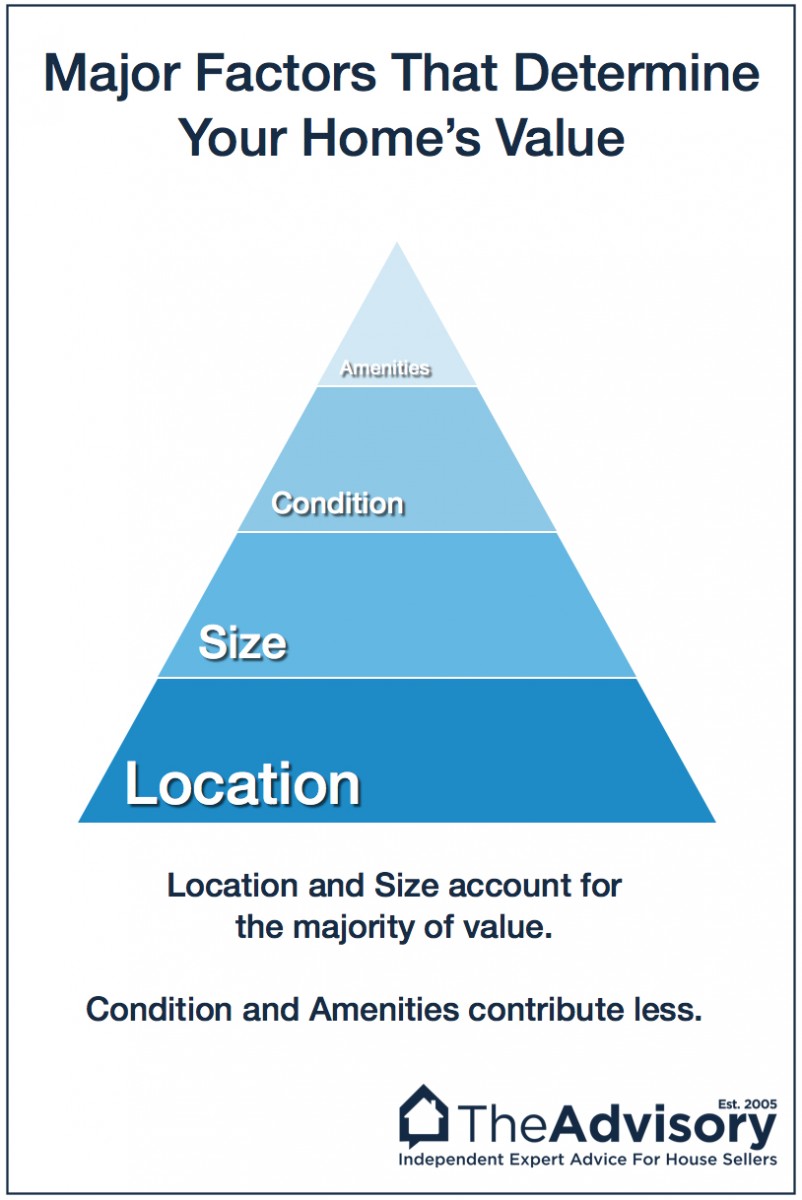
Bottom line:
- Location and Size account for the majority of ‘value’ for any home.
- Condition and Amenities contribute far less to ‘value’ but can make a big impact on ‘saleability’ (i.e. how much more appealing it is to buyers compared to similar homes).
Learn more: How to add value to you home
Part 4: How to intelligently research open market value
Successful house sellers know:
The key to accurate valuation is to see the market through the eyes of buyers.
Focus on finding facts because facts are what will give you the best insight into what buyers are seeing and thinking:
- What similar homes historically sold for are facts.
- What similar homes recently sold for are facts.
- What similar homes you’ll be competing against are facts.
- What similar homes are failing to sell for are facts.
In hot markets (where prices are rising) what buyers will be willing to pay will be above what similar homes recently sold for, but below what similar homes are failing to sell for.
In cold markets (where prices are falling) what buyers will be willing to pay will be below what similar homes have recently sold for, but potentially above what similar homes have historically sold for.
Where to go to find these facts
Most can be found quickly and easily on Rightmove or Zoopla.
However, some critical facts are not public record…
…Only estate agents have them (and only certain estate agents at that).
We’ll explain all as we go.
How to find out what similar homes ‘historically’ sold for
Data collected by HM Land Registry allows you to find out the actual price someone paid, for any residential property sold in England & Wales since April 2000.
Lots of websites give direct and free access to this data, but we think it’s most easily viewed via Zoopla or Righmove:
How to find out what similar homes ‘recently’ sold for
- You can get close by searching Zoopla &/or Rightmove for similar properties marked ‘Under Offer’ or ‘sold STC’.
- You’ll be able to see the last advertised asking price but you won’t know the actual agreed sale price.
- Only the estate agent that negotiated the sale will know the agreed sale price.
Pro Tip: This last point is worth expanding on because:
A) It explains why despite all the information available on the Internet, its still local estate agents that hold the master key to really accurate valuation advice.
B) It also highlights the core reason why not all estate agents’ valuations are created equal:
- The agents serving your patch will have differing levels of direct contact with the buyers active in your price bracket (i.e. the buyers that will be interested in your home).
- The agents with the most direct contact will have the most relevant / most up-to-date market intelligence / market experience to share with you (and inform their valuation).
- What an agent has recently sold (and is currently selling) determines how in touch they are with the facts in the market that will best inform how buyers are likely to react to your home.
How to find the homes you’ll be competing against
- Search Zoopla an/or Rightmove for property listed ‘for sale’.
- Focus on looking for houses that are similar to yours and near yours (just to clarify, near = 1/4 mile in urban areas and 5-10 miles in rural areas).
- You should look for houses with similar amenities and roughly the same size and number of bedrooms and baths that are on the market now.
- These are the houses you’ll compete with, were you to put your house on the market today.
- Don’t loose sight that you’re looking at ‘asking prices’ here, and remember ‘asking prices’ are NOT ‘getting prices’. In many cases the difference can be significant.
How to find out what similar homes are ‘failing’ to sell for
- Again, search Zoopla and/or Rightmove (as above) for similar properties marked ‘for sale’, but this time, pay close attention to when the properties were added to the market.

- In cold markets, anything on market and unsold longer than 90-120 days is probably overpriced.
- In hot markets, anything over 40-60 day is probably overpriced.
How to realistically compare your property to the competition
Step 1:
- Fire up Rightmove or Zoopla and find all the property you’d go look at if buying your house all over again.
- The industry phrase is searching for ‘comps’ (comparable property).
Step 2:
- Print out the details, study them carefully and keep them safe (they will come in handy when the Estate Agents come round).
- Your ‘comps’ should all fall neatly into a nice tight price range.
- However, there will be one or two properties that look like “comps” but priced much higher or lower than the rest.
- There is always a reason for this!
- It’s usually that a seller is simply asking too much money or that there is something wrong with the property.
Step 3:
- Put these ‘freak comps’ to one side because they will give you a false impression of what your house is worth.
- You can always quiz the estate agents that come to value your property a little later.
Objectivity is key
To help you further, here are the top reasons a buyer would be willing to pay more for a property (that at first glance looks similar to yours):
- It’s in a better location which might be views to one person or access to schools for another.
- It has garage or off-street parking.
- It has private outdoor space (especially if it’s a large south-facing garden).
- Has an en-suite bathroom.
- Has double bedrooms (min size 2.7 x 2.7m).
- Has a conservatory that blends with the existing building.
- Has a larger internal square footage.
- Detached is better than semi-detached which is better than end of terrace, which is better than mid-terraced.
- Has newly fitted bathrooms or kitchens.
- Has a large kitchen you can eat in.
- Is newly decorated throughout tastefully.
- Has period features.
- Is well maintained.
- Has double glazing that compliments the style of the house (e.g. not UPV on a period property).
- Has an alarm system.
- The property is freehold or share of freehold.
- Has a healthy amount of time left on the lease (more than 60 years).
- Has a superior outlook (i.e. over green space as opposed to a road, railway or eye-sore).
You don’t need to know exactly how much extra value any of these things would add (many things are subjective anyway).
You just need to be critical and realistic about why your competition could command a higher or lower price tag than your own property.
Remember…
…Property valuation is just applied guesswork!
As long as you’ve looked at the correct information sources, your opinion will be robust and form a great base from which to fine tune with the help of a strategically chosen estate agent.
Helpful research tools
Over and above Rightmove and Zoopla, the following will come in handy:
PropCast™ – The UK’s first house selling weather forecast.
- Tells you how hot or cold the market you’re looking at is.
- That will help you decide if a property is overpriced or if it’s just a slow market.
PropertyBee – Browser plug-in for Firefox that interrogates Rightmove property adverts.
It gives you a complete history of:
- When the property was put on the market
- Price changes (up and down) since the property was listedWhether the property has gone STC and come back onto the market
- Any changes to the details since the property was listed.
Property Detective – Paid for report providing facts about the local area around any property in England or Wales.
The reports include information on:
- Crime rates
- Schools
- Amenities
- Noise pollution
- Flight paths
- And more…
The problem with historic sold prices & HM Land Registry data
- As we’ve previously mentioned, the HM Land Registry is where the selling prices of UK property transactions are recorded.
- They provide access to their database so there is no end of websites displaying this data.
- It’s concrete and credible and so the average member of the public puts great stock in it…
…Please don’t be average!
As discussed, houses are worth what buyers are willing to pay.
What buyers are willing to pay is determined by what they can buy right now.
Buyers can’t buy whats already sold and so looking at historic sold prices is to look at yesterday’s market – A market that no longer exists.
As the saying goes…“Past performance is no guarantee of future returns”.
Just because someone down the road sold a near identical house for £350,000 9 months ago, there is no guarantee you will get the same:
- What if they’d overpriced the home, sat on the market an age, then had to slash the price a couple of time and end up having to accept a below value offer to overcome buyer’s feeling the house was blighted in some way?
- What if the market has fallen?
- What if the market is currently flooded with better properties at lower prices?
- What if the market was flooded when your neighbour sold but today it’s not and yours is the only one of its type available?
- What if…what if…what if?
At best, Land Registry data on sold prices should be seen as a rough guide or an indication but nothing more.
The classic vendor mistake
Here’s part of an email conversation we had recently with Cathy Wright. It details her thinking after we’d asked here how much she thought her home was worth.
Interesting to know, she was not getting any interest on the market at this time (her asking price was currently £190k having being reduced from £195k).
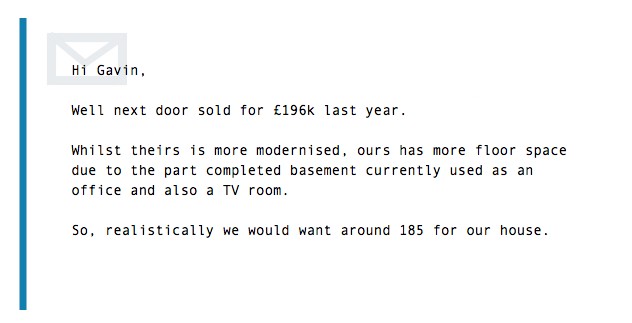
- As you can see, she’s going off historic sold prices.
- She is not taking into account what’s on the market right now and how she compares to the competition.
- When we looked at the market it was pretty clear to see other similarly desirable properties available for less money.
- And that’s why she wasn’t selling.
Key takeaways:
#1 – The big problem with HM Land Registry data is that it’s old.
- Once a transaction reaches legal completion and HM Land Registry records the price paid, it then takes 3 months to reach the public domain.
- However, what’s not often considered is that the recorded price paid was probably agreed between the buyer and seller 3 month before that.
- For example, a sale that completed 1st September would only become public record 1st December but the price you’re looking at was probably agreed back around 1st May.
- The market moves constantly and so HM Land Registry Data is interesting but it’s also ancient history.
#2 – It’s fine to take a historic sold price for a similar property, and estimate today’s market value by multiplying by a rate of house price inflation.
However, when selling a house, looking at your competition and pricing accordingly to remain competitive should always trump this analysis.
Using £/sqft to value property
- This is a flawed method primarily because homebuyers tend to evaluate property by the number of bedrooms not on a raw square footage basis.
- All other things being equal, most buyers will view a 3 bed as more valuable than a 2 bed etc.
- However, comparing your home to others recently sold (and currently for sale) based solely on a £/sqft basis, can be a handy way to build a rough estimate of your home’s value.
- It’s also a useful way to provide context when comparing different areas of a city or the country.
- Just don’t make the mistake of thinking this is gospel.
Not all square feet are created equal
When performing this sort of analysis, keep in mind the following factors:
- Uninhabitable square footage is less valuable that habitable square footage (eg. bedroom sqft are more valuable then hallway sqft which are more valuable than void space sqft).
- Square footage with restricted ceiling height is less valuable than square footage with full ceiling.
- Newly modernised high spec square footage is more valuable than square footage in need of modernisation.
- Configuration and generosity of room sizes will also have an effect on value.
- Don’t assume floor plans are accurate – They are not.
- What’s more they may not all be measuring the same thing. They could be measuring external gross, gross internal or net internal area (make sure you know what you’re looking at).
Key takeaways:
- £/sqft valuation is a useful tool.
- In London you’ll find many estate agents use it extensively to value property.
- Although that doesn’t make it right or accurate.
- In our view it just makes them lazy.
- £/sqft calculations should be used only as a guide (a point worth keeping in mind when buying too).
Part 5: The problem with free valuations from most estate agents
A competent (and ethical) estate agent will be your most useful ally when it comes to correctly accessing how much buyers will be willing to pay for your home.
However, probably the number one reason in the world for property not selling (or underselling) is deliberate overpricing / overvaluation:
- In the UK it’s estimated that roughly 50% of all homes that go to market, either don’t sell or fail to sell within 12 months.
- It all stems from free estate agency valuations, which create an environment that encourages homeowners to choose to list their homes at overinflated prices with the least competent estate agent.
The ‘price is right’ game
- The great challenge estate agents have when working with homeowners is presenting their opinion of value and what price is achievable.
- Often times what a homeowner does is to interview 2 or 3 estate agents and ask them all the same question, “How much do you think my house is worth?”
- They compare one estate agent’s answer against the others to see who gives them the highest number.
- Then make their decision on whom to hire based on price.
- Totally understandable given that to the general public the majority of estate agents all look the same, sound the same and do the same.
- What else is there to differentiate them on but price promised (and cost of service)?
The most common mistake house sellers make is to list their home at the highest price with the least competent estate agent.
The estate agency industry we deserve?
1,000,000’s of homeowners have gone before you and played ‘the price is right‘ game with estate agents.
Over time this has created an estate agency industry acutely aware that:
Giving an honest opinion of value (at a free valuation visit) is often NOT as effective (at securing new business) as telling the homeowner something more flattering.
As one very successful London agent once told us:
The big problem with being an estate agent is that you don’t win instructions by telling the truth!”
Be in no doubt – most free estate agent valuations ARE a bidding war.
The winner of that bidding war (more often than not) being the estate agent who comes up with the highest promised price for the home.
It’s a universal problem!
In a recent survey we asked estate agents covering over 2000 postcode districts one simple question:
“Is deliberate ‘overpricing to win instructions’ a problem with one (or more) of your competitors?”
100% of respondent said ‘yes’!
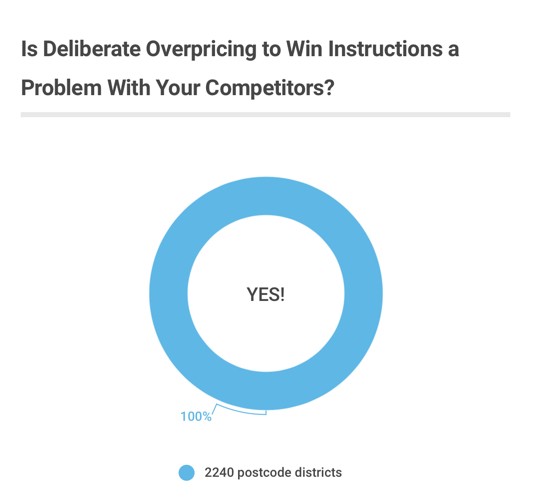
Be in no doubt, valuation-bidding wars are happening in every market in the UK. In every price bracket and in every type of estate agency:
- Online
- Offline
- Hybrid
- High street
- Corporate
- Franchise
- Independent
- Upfront fee
- Deferred fee
- Fixed fee
- No sale, no fee
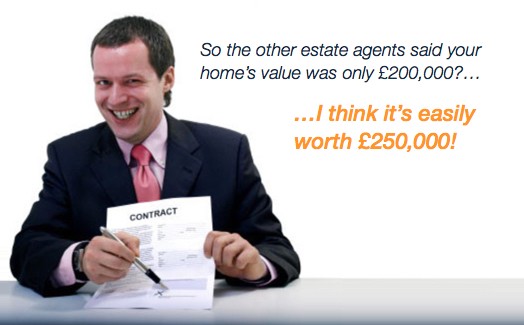
When you think about it, it’s crazy really because:
- Estate agents have absolutely zero control over the value of your home.
- They no more determine today’s market value of a property any more than the weatherman dictates the weather.
- The market (and the market alone) determines the value of your home.
Never the less, deliberate over-pricing / over-valuation is a strategy that wins business. Always has and always will.
What can be done to stop it?
Simple, make a stand and commit to being a savvy seller that values facts and truth over opinions and empty promises.
We can tell you, estate agents are desperate to meet people like that.
You’ll probably get hugged…
..Or at the very least you’ll receive better service, huge respect and the best possible result from your sale.
Making it happen is easy, all you do is proactively demonstrate (to estate agents) you value, reward and can handle the truth…
…Otherwise it’s back to the front line of the valuation bidding wars you go.
So here’s your plan of attack:
Administer some estate agency truth serum
To get the truth out of them, estate agents often need to be given permission to be brutally honest.
You can help by having a quick discussion with them BEFORE they offer their thoughts on what they think your home is worth.
Here’s the dialogue to use:
You: “Before we talk about price, I want you to understand that I don’t want you to tell me what you think I want to hear.
I want you to tell me the truth.
I need to know what you honestly think I can sell this home for and how you came to that conclusion.
It doesn’t mean I’ll agree with you, but I want you to know that I’m not basing my choice of agent on who tells me the highest price.
Does that sound fair?”
Ask the 3 magic questions
Instead of (or as well as) the dialogue above, another way to get the truth out of estate agents is to ask the questions below.
Again, do it before the estate agent has given you their opinion of your property’s value.
- What are the properties on the market right now that the buyer of my property is going to be giving serious consideration to?
- How does my property compare to these properties?
- Where do we need to position my property against these properties to make mine stand out as the best value for money?
If none of these properties are generating interest, the next question to ask is:
- How far below the competition do we need to price my house to generate offers?
The bottom line about estate agent valuations
- Estate agents have no control over the value of your home.
- A good estate agent knows they’re not there to tell you what they ‘think’ your home is worth.
- A good estate agent knows their ‘opinion’ has little to no merit and that only ‘facts’ (and the opinion of potential buyers) count.
- A good estate agent knows their real job is to show you the facts in the market so that together you can estimate value and select an asking price that will attract buyers.
Find out which local agents give the most truthful FREE valuations
The estate agents that sell property for close to asking price are the ones giving the most accurate valuation advice.
Find out which agents are most accurate / truthful in your area:
Final thoughts
Everyone has an opinion of what your home is worth.
But you’ll only know whose opinion was most accurate the day you exchange contracts with a committed buyer.
That said, the chart below shows you where opinions tend to lie in relation to market value.
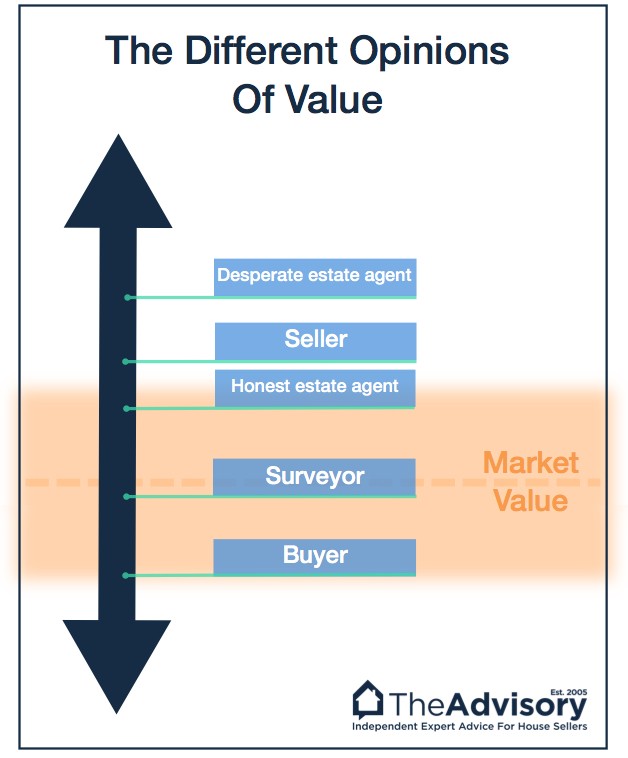
- Broadly speaking, buyers tend believe the value to be lower and sellers believe it to be higher.
- A surveyor should be about spot on or perhaps a bit low.
- The honest and experienced estate agent will be at the top end of what is realistically achievable, as they will know recent sale prices of similar homes and how much buyers (in your price bracket) have been willing to negotiate.
- Other estate agents, depending on their level of desperation and lack of integrity will be well above market value.
In the end, the opinions you should pay most attention to are those of buyers (and their surveyors if buying with a mortgage).
It’s then your estate agent’s job to raise buyers’ opinions as high as possible through good marketing and negotiation (and in the case of surveyors, the provision of supporting market data / ‘comps’).
Offers from buyers are NOT proof of market value
Just because you get an offer at a certain price, don’t jump to take it as conclusive proof your home is worth that amount.
The fat lady only sings once a buyer has exchanged contracts at that price.
Scenario one:
Your home needs work and a buyer makes you an offer but underestimates the scale of the work needed.
- When they find out (after survey) they pull out.
- As such you may only find a buyer willing to exchange contracts (with full knowledge of the work) at a lower price.
Scenario two:
You receive an offer from a buyer that has a property to sell.
- Their home is on the market for £500,000 but it’s unsold and overpriced by £50k.
- For the buyer to perform at the price they’ve offered you, they need to sell for the full £500,000.
- That’s not going to happen and so the price they’ve offered is not be taken as proof of market value for your home.
The hierarchy of information
If you want to properly research the value of your home for sale, there are four levels of information you need to progress through:
Level 1 – Look at Zoopla valuation estimates (just to see if it needs changing).
Level 2 – Look at historic sold prices of comparable properties.
Level 3 – Look at comparable properties currently on the market to see what prices your competition are asking, failing to sell at and going under offer at.
Level 4 – Identify and interrogate the local estate agents that have the most up-to-date knowledge about buyers (in the market right now looking in your price bracket) and the results of recent sales (not yet recorded at HM Land Registry).
The 5 golden rules
Rule 1 – Never make any important decisions bases on figures provided by an online valuation tool or house price calculator.
Rule 2 – Never take an estate agent’s opinion of value at face value.
Opinions are meaningless unless they are backed up with facts (and they have to be the ‘right’ facts at that):
- What similar homes historically sold for are facts.
- What similar homes recently sold for are facts.
- What similar homes you’ll be competing against are facts.
- What similar homes are failing to sell for are facts.
Rule 3 – ‘Recent’ sold prices are a more accurate than ‘Historic’ sold prices when it comes to accessing what buyers (in the market right now) would be willing to pay for your.
Rule 4 – The agents serving your patch will have differing levels of direct contact with the buyers active in your price bracket (i.e. the buyers that will be interested in your home).
- The agents with the most direct contact will have the most relevant / most up-to-date market intelligence / market experience to share with you (and inform their valuation).
- What an agent has recently sold (and is currently selling) determines how in touch they are with the facts in the market that will best inform how buyers are likely to react to your home.
Rule 5 – Today’s value is determined by today’s competition (it’s that simple).
A new property added to the market or removal of one, which has just sold changes the market instantly.
A buyer can now select the new property and the one that sold is no longer competing in today’s market.
Get FREE valuations from your top rated local agents
Use our free and impartial estate agency comparison tool to find your best local agents and request free valuations.
Related guides
Related guides
Did you
know?..
The hotter your market
the easier your sale...



